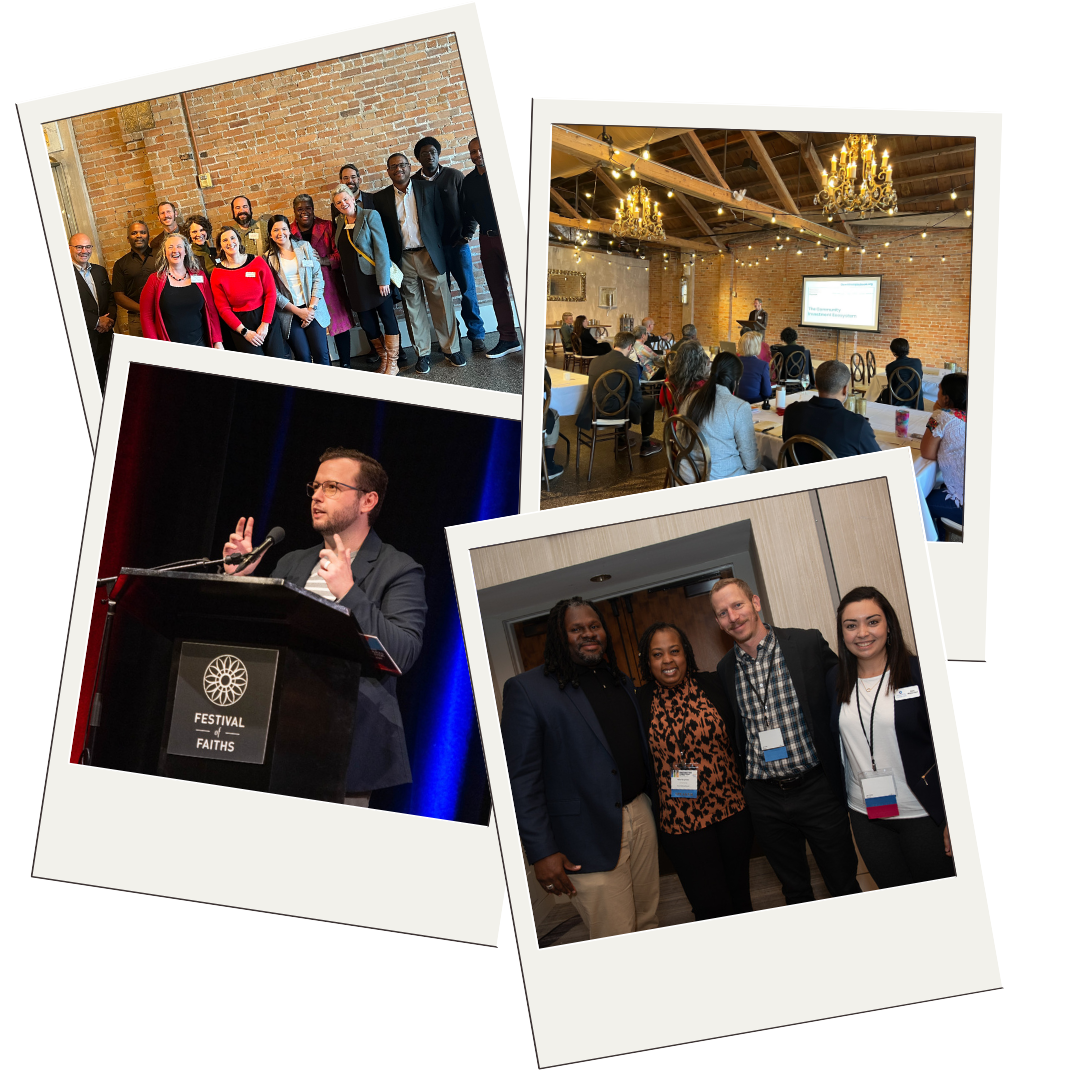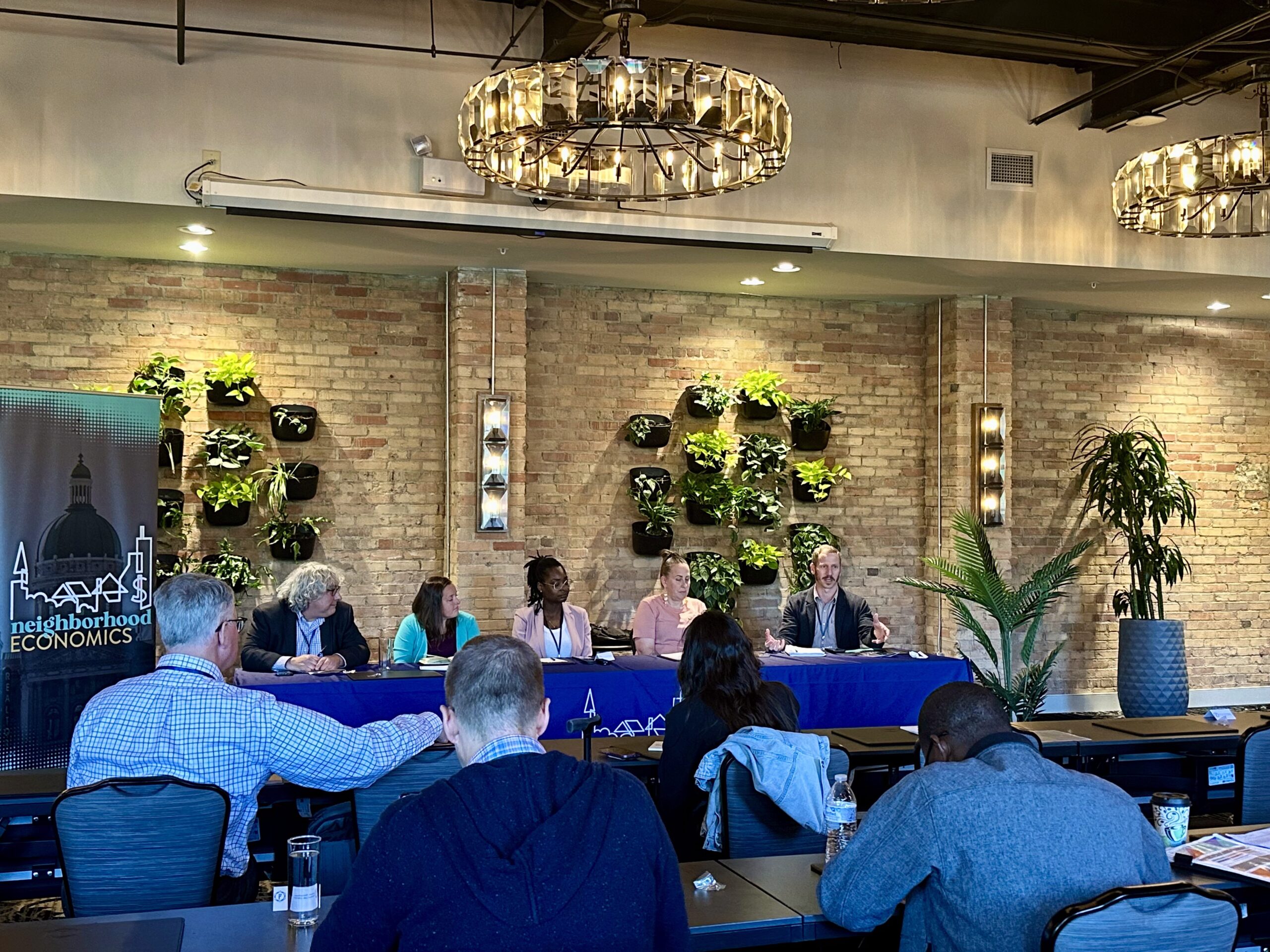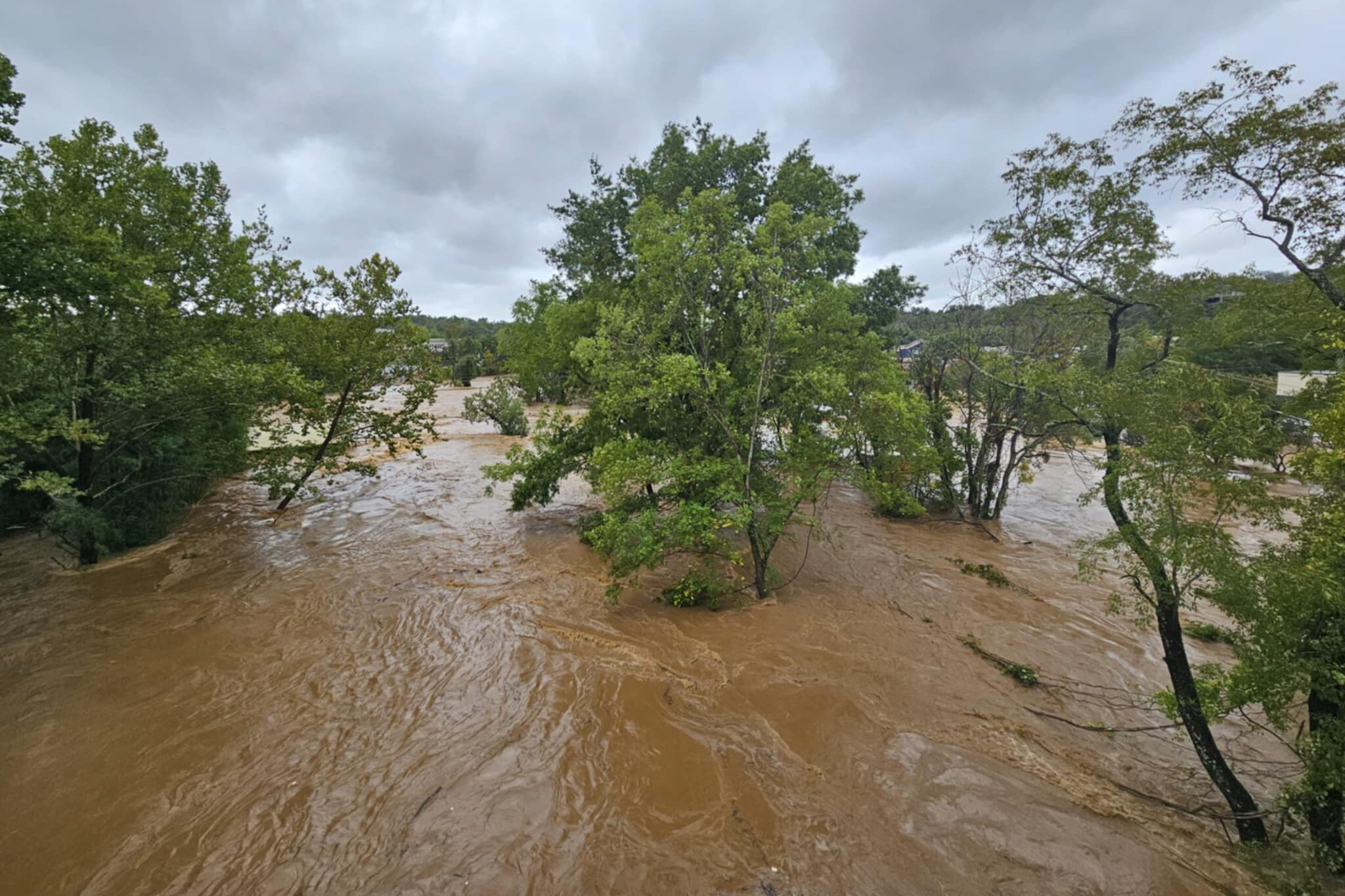Invest Appalachia team members spoke at more than a dozen conferences and events in 2023 to demystify community-driven investment and invite people into the work.
If this was easy, someone would have done it already.
This is a reminder for all of you who are working on big picture challenges. Creating meaningful change doesn’t just require new sources of capital, new investment products, and new approaches to underwriting and deal structuring. It also requires new ways of thinking, new mental models and frameworks to balance major considerations like risk versus return, impact versus efficiency, and proven versus innovative. As a relative newcomer to the community finance sector, I am constantly asking why – why does this have to be done that way? Why does that policy, practice, or protocol exist, and who does it really benefit? Is this necessary, or is it just how it’s always been done?
IA’s goal is to take the best of impact investing, and make it work for the underserved communities of Appalachia. That will require leaving behind ideas and practices that are not meeting the needs of these communities, while also building on the capacities, infrastructure, and tools of the existing system.
Learn by doing, take calculated risks, reflect and adapt.
Time is of the essence, and Appalachia’s investment opportunities are crying out for capital now. We also know that money follows money, and to break the vicious cycle of disinvestment, we need to help communities access capital to build assets before additional investment will flow.
So, we take our core mandate seriously – be proactive in getting capital to the ground, into communities with urgent need and opportunity. The IA Fund has ramped up our deployment since our launch a year ago, with over $4 Million across six community development loans so far, and another ten projects totalling $6 Million in underwriting with an early 2023 target. On the Catalytic Capital front, we’ve committed over $2.3 Million in the form of flexible and innovative investment tools, supporting 30 distinct projects and leveraging over $8.6 Million from other sources.
Community-driven capital requires collaboration and capacity.
Capital doesn’t flow to underserved communities naturally – like water, it takes clear intent and a coordinated system to move capital “uphill.” IA was purposefully designed to work within an investment ecosystem, and we continue to see opportunities to strengthen that system. Our capital relies on collaboration, on investment partners and referral networks and trusted community stakeholders, to find the right destination. We’ve worked with dozens of partner organizations, including co-investing with 6 different CDFIs, in the past year. Our approach also requires capacity rooted in communities – the place-based capacity of local stakeholders to “frame up” their own projects and priorities as investable propositions. We partnered with Mountain Bizworks on a Western NC cohort of “Community Investment Framers,” local leaders who grew their investment skills and knowledge and moved forward community projects. And, we’re excited to partner with the Federal Reserve Bank of Richmond on a multi-state cohort of Community Investment Framers in 2024.
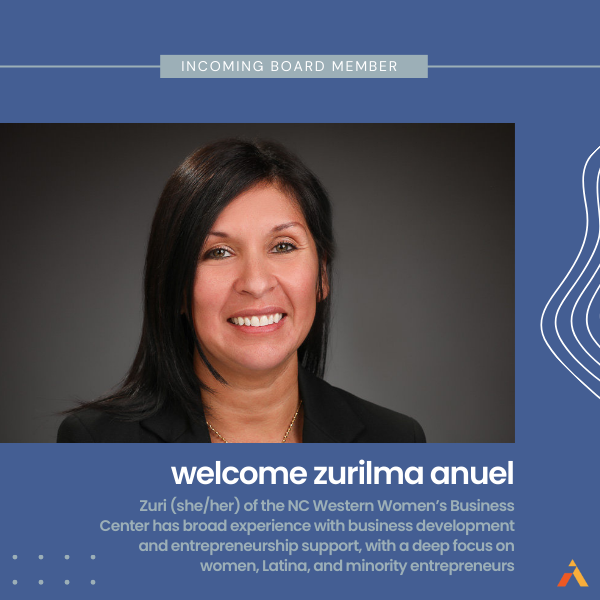
IA Board Welcomes Zurilma Anuel as New Member
Zurilma “Zuri” Anuel (she/her) of the NC Western Women’s Business Center will join the IA Board in 2024. Zuri has broad experience with business development and entrepreneurship support, with a deep focus on women, Latina, and minority entrepreneurs. Her experience serving on IA’s Community Advisory Council equips her with a strong understanding of Invest Appalachia’s mission and model. Zuri will replace Kevin Dick of the Carolina Small Business Development Fund, who Board and Staff thank for his leadership and service.
A lean startup model for an organization has advantages - and limits.
IA was always intended to be a lean, efficient, partnership-oriented organization. Leaning on our partners and contractors to leverage the region’s capacity has allowed us to accomplish a lot with a very small team, but the scale of our current operations and emerging opportunities pointed to the need for an additional staff person. I’m thrilled to share that Mae Humiston will join our IA team in January as Director of Grants and Operations. Mae is deeply rooted in the region, shares IA’s vision and analysis, and possesses a variety of critical skills from her time working with non-profit community development organizations, including as the founding director of a consumer lending CDFI and as a non-profit support specialist with a community foundation.
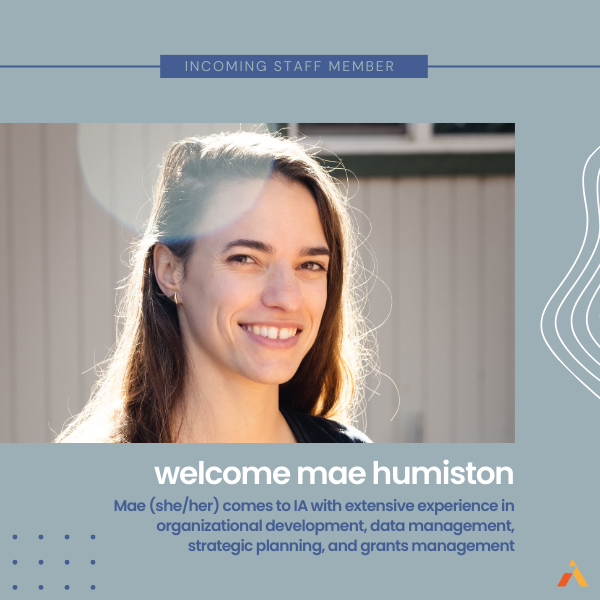
Welcome to Mae Humiston, Incoming IA Director of Grants and Operations
Mae Humiston (she/her) comes to IA with extensive experience in organizational development, data management, strategic planning, and grants management in Appalachia. Previously, Mae ran the Nonprofit Support Services program at the Foundation for Appalachian Kentucky, providing practitioners in Eastern Kentucky with critical strategic planning and grant writing capacity. She was the founding Director of Redbud Financial Alternatives, managing the start-up and growth periods, which was the first rural Community Development Financial Institution (CDFI) in the nation focused on fair consumer finance and credit improvement. Mae came to Kentucky through Community Farm Alliance where she helped institute remote community organizing systems and fostered the creation of Northfork Local Food, a local food system development organization in Eastern Kentucky. Mae was born and raised in a rural community in the mountains of Virginia. She has a B.A. in Anthropology from Tufts University. Mae currently serves on the board of Human Economic Appalachian Development (HEAD) and as the volunteer wayfinding coordinator for Pathfinders of Perry County, an organization that focuses on helping people access the outdoors.
Climate change, and our approach to resilience, will define this century.
Like many communities around the country and the world, Appalachia is already experiencing the very real effects of climate change. It will affect every aspect of our lives and economies, from food production to housing to downtowns to public health to energy systems. It will also drive new in-migration patterns capable of transforming our region. We must be proactive in planning and investing for climate resilience across every kind of system if we want a future that is inclusive, equitable, and sustainable. Our report Climate Resilience in Central Appalachia: Impacts and Opportunities provides a starting point for additional research, analysis, and collaborative action. Our podcast with Renegade Capital on the topic is another call to action. We will continue to prioritize climate resilience in our investments, messaging, and partnerships. There is an urgent need for all of us to start thinking long-term.
Engage in every direction - community investment can’t be siloed.
Part of IA’s approach is to de-mystify investment, to break down barriers and build connections across different pieces of the ecosystem. By growing the number and variety of actors who see themselves as part of a community investment system, it can become more equitable, inclusive, and community-accountable.
So we engage with a wide variety of audiences, as evidenced by the variety of speaking engagements IA staff participated in this year: Appalachia Big ideas Fest (Hazard, KY) Photos; Brushy Fork Leadership Institute (Berea, Kentucky); Credit Builders Alliance Symposium (Washington, DC); Funding Forward – Funders for LGBTQ Issues (Chicago); WNC Access to Capital Convening – Dogwood Health Trust (Asheville, NC); Festival of Faiths – Creating Loving Communities: Bridging Divides (Louisville); Kentucky Rural-Urban Exchange 10 year celebration – The Golden Thread (Louisville); Opportunity Finance Network Small Business Finance Forum (Chicago); Global Impact Investing Network and Catalytic Capital Consortium (Copenhagen, Denmark); Financial Innovations RoundTable – UNH Carsey Center/NY Federal Reserve (New York); Appalachia Funders Network Convening (Flat Rock, NC); Investing in Rural America Conference – Richmond Federal Reserve (Roanoke, VA); and more!
We look forward to more promise, partnership, and powerful work in 2024. Thank you for everything that you do.
Sincerely,
Andrew Crosson
CEO, Invest Appalachia
